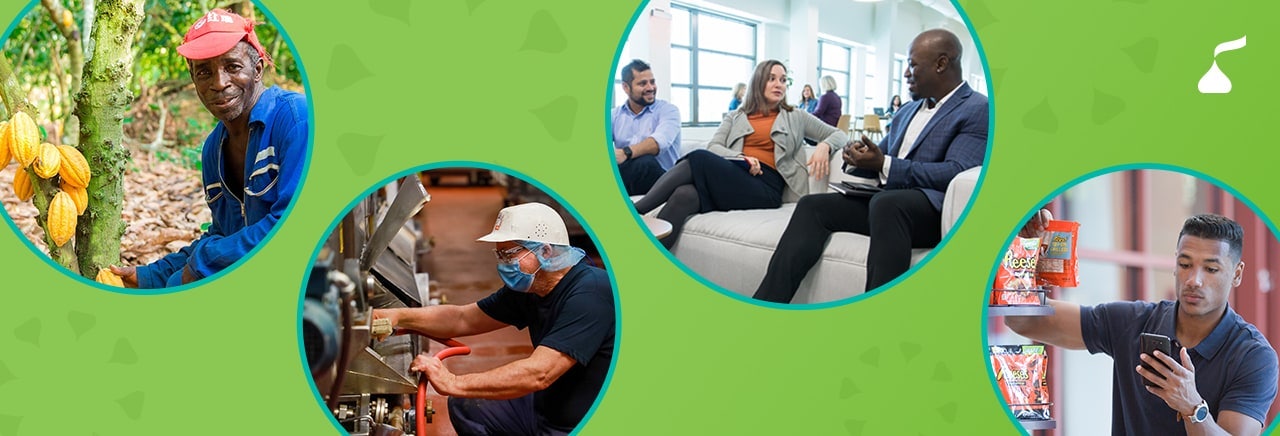Human Rights: Working Across Hershey’s Value Chain to Support the People Behind Our Products
For more than 125 years, The Hershey Company has operated with the foundational understanding that the many people around the world who help bring our iconic products to market are central to our success. As such, we have the responsibility to support initiatives that work to ensure everyone in our value chain can exercise fundamental human rights.
In another year filled with its own unique challenges, we continued to work diligently to uphold and advance essential human rights across our value chain. With the COVID-19 pandemic exacerbating inequalities, the impact of climate change becoming more visible, and the various economic implications of both, our commitment to human rights is unwavering. We are committed to delivering on the goals we set, driving our human rights agenda forward and collaborating with key stakeholders to advance positive change.
Furthering Progress on Cocoa
Our cocoa sustainability strategy, Cocoa For Good, is designed to help farmers and their families thrive. We have invested heavily with external partners who have developed targeted programs to build a responsible, sustainable cocoa supply chain, with a particular focus on West Africa. Through Cocoa For Good, we’re investing half a billion dollars by 2030 to nourish children, empower youth, build prosperous communities and preserve natural ecosystems. Under this program, we continue to collaborate with farmers to grow our direct cocoa sourcing initiatives, while helping build and foster stable livelihoods and financial resilience.
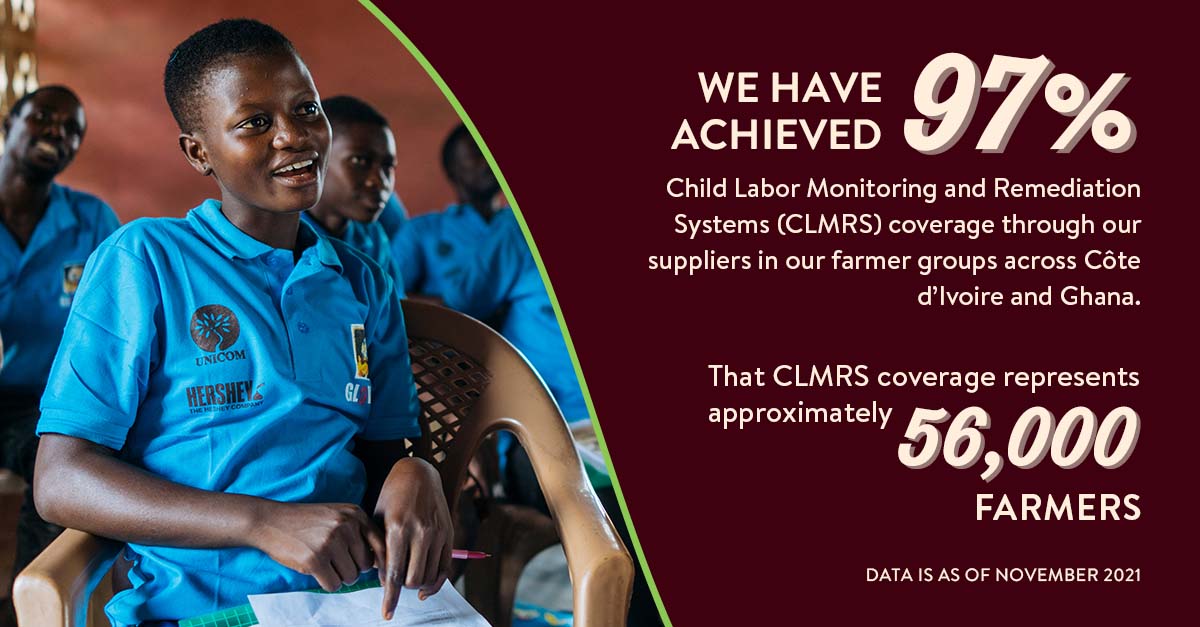 Since 2019, we have made significant progress in our Child Labor Monitoring and Remediation Systems (CLMRS)*, achieving 97 percent coverage in farmer groups, representing about 56,000 farmers, towards our goal of 100 percent coverage in Côte d’Ivoire and Ghana-sourced cocoa by 2025. This coverage occurred even as we expanded our total number of farmers and farmer groups. CLMRS is the most effective system available in finding and remediating child labor in cocoa. To date, our CLMRS programs have found no instances of forced labor in our cocoa supply chain. In partnership with our suppliers, we are rolling out CLMRS as we scale our direct cocoa sourcing, which provides us more information about conditions, including labor practices, on farms where the cocoa used in our products is grown. We are at more than 70 percent direct cocoa sourcing in Côte d’Ivoire and Ghana—a critical milestone which bolsters supplier collaboration. Direct cocoa sourcing is key in giving us greater visibility into where and how our cocoa is grown, and that insight allows us to better support those communities. Finally, as a member of the International Cocoa Initiative’s Forced Labour Sub-Group, we are working with other industry members, civil society representatives, peers and technical experts to continue to advance knowledge, skills and action on preventing, monitoring, identifying, and addressing child labor in cocoa supply chains.
Since 2019, we have made significant progress in our Child Labor Monitoring and Remediation Systems (CLMRS)*, achieving 97 percent coverage in farmer groups, representing about 56,000 farmers, towards our goal of 100 percent coverage in Côte d’Ivoire and Ghana-sourced cocoa by 2025. This coverage occurred even as we expanded our total number of farmers and farmer groups. CLMRS is the most effective system available in finding and remediating child labor in cocoa. To date, our CLMRS programs have found no instances of forced labor in our cocoa supply chain. In partnership with our suppliers, we are rolling out CLMRS as we scale our direct cocoa sourcing, which provides us more information about conditions, including labor practices, on farms where the cocoa used in our products is grown. We are at more than 70 percent direct cocoa sourcing in Côte d’Ivoire and Ghana—a critical milestone which bolsters supplier collaboration. Direct cocoa sourcing is key in giving us greater visibility into where and how our cocoa is grown, and that insight allows us to better support those communities. Finally, as a member of the International Cocoa Initiative’s Forced Labour Sub-Group, we are working with other industry members, civil society representatives, peers and technical experts to continue to advance knowledge, skills and action on preventing, monitoring, identifying, and addressing child labor in cocoa supply chains.
We also continue our holistic support for children’s well-being through our partnership with Project Peanut Butter to distribute ViVi, a vitamin-fortified snack shown to increase nutrition and academic performance, to schoolchildren. The initiative, which began in Ghana in 2015, reached a new milestone this year by reaching thousands of schoolchildren in three regions of Côte d’Ivoire. Through our partnership with the National Nutrition Council of Côte d’Ivoire, we anticipate reaching more children by the end of 2022.
Promoting Human Rights Within & Beyond Our Four Walls
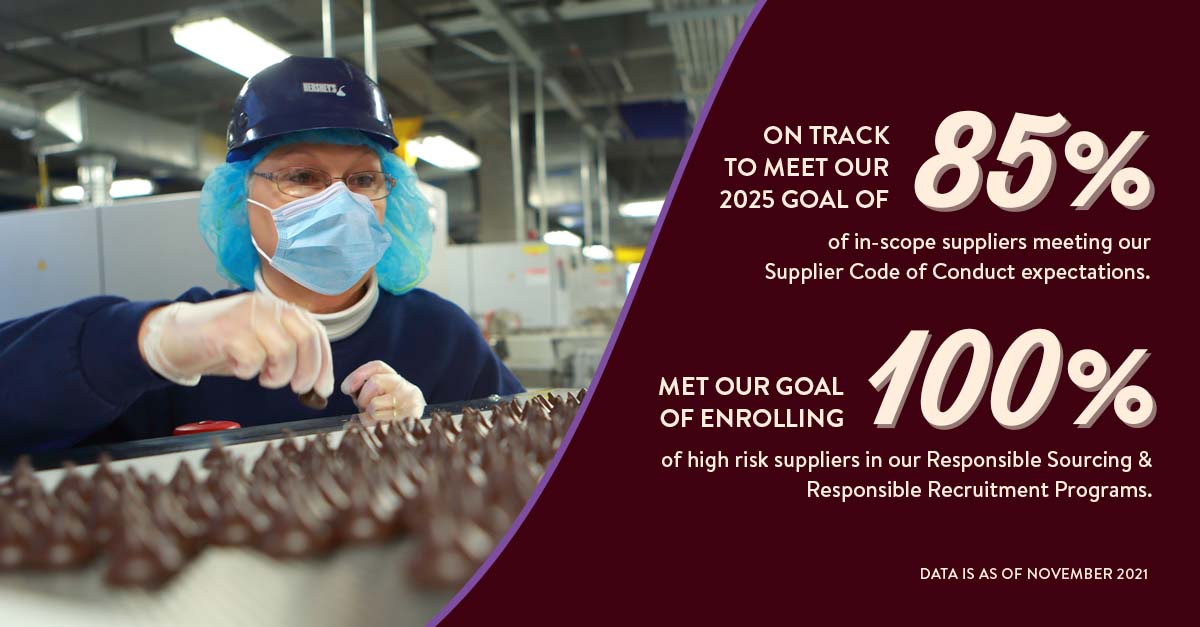 In 2020, we launched our Responsible Sourcing Supplier Program where we work with independent third parties to monitor our Tier 1 suppliers’ compliance with our Supplier Code of Conduct. In 2021, we met our goal of enrolling 100% of high-risk suppliers in our Responsible Sourcing & Responsible Recruitment programs, which empowers our suppliers to drive positive change for our people, the planet and the long-term sustainability of our supply chain.
In 2020, we launched our Responsible Sourcing Supplier Program where we work with independent third parties to monitor our Tier 1 suppliers’ compliance with our Supplier Code of Conduct. In 2021, we met our goal of enrolling 100% of high-risk suppliers in our Responsible Sourcing & Responsible Recruitment programs, which empowers our suppliers to drive positive change for our people, the planet and the long-term sustainability of our supply chain.
With unprecedented global supply chain disruptions, it was critical for Hershey to have more visibility into our partners’ operations to ensure our standards were upheld. This year, we deployed new tools to adapt, as health and safety considerations sometimes hindered the ability to conduct onsite audits at our suppliers’ facilities. In these circumstances, we implemented Sedex Virtual Assessments to monitor and support our suppliers and their employees during a time of heightened vulnerability with the pandemic, this allowed us to identify where extra assistance was needed.
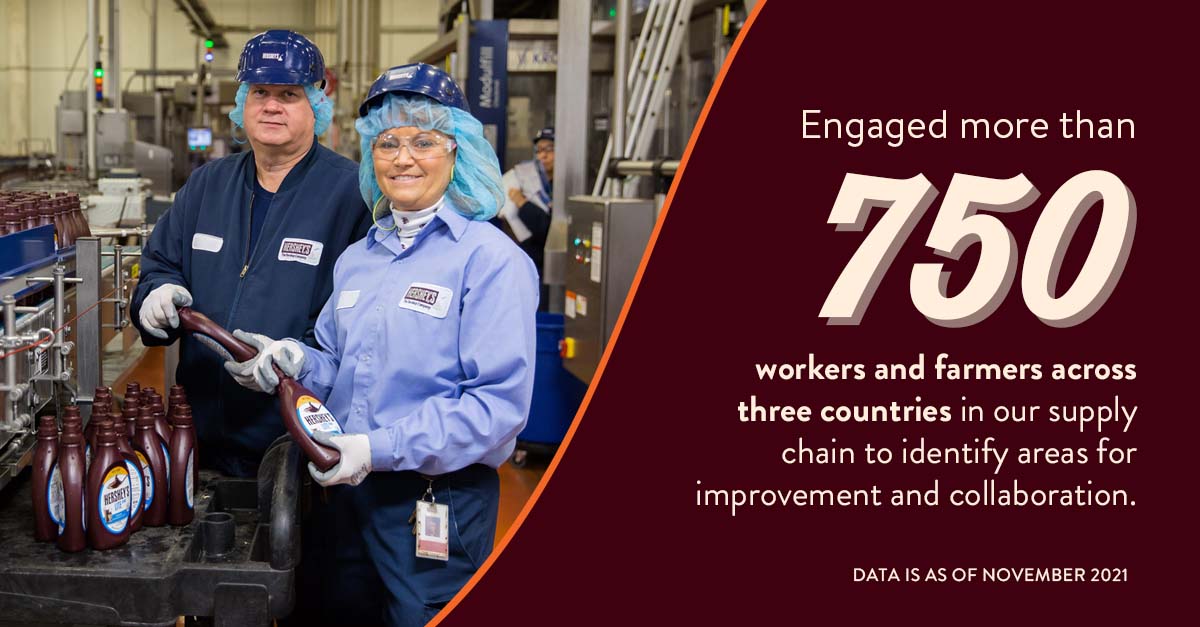 In an effort to engage directly with workers around the world, we moved beyond our traditional compliance mechanisms and conducted three worker voice surveys in Hershey facilities in India and Malaysia as well as temporary workers on cocoa farms in Côte d’Ivoire. Through these surveys, we interacted with more than 750 contract and temporary workers to understand their experience being a part of Hershey’s supply chain and opportunities for growth and improvement. This engagement mechanism has allowed us to have meaningful conversations with individuals in various capacities and functions across the globe—an initiative we’ll continue to implement and expand in 2022.
In an effort to engage directly with workers around the world, we moved beyond our traditional compliance mechanisms and conducted three worker voice surveys in Hershey facilities in India and Malaysia as well as temporary workers on cocoa farms in Côte d’Ivoire. Through these surveys, we interacted with more than 750 contract and temporary workers to understand their experience being a part of Hershey’s supply chain and opportunities for growth and improvement. This engagement mechanism has allowed us to have meaningful conversations with individuals in various capacities and functions across the globe—an initiative we’ll continue to implement and expand in 2022.
Additionally, we maintained our 100% completion rate of The Hershey Company human rights training by all procurement professionals and expanded the requirement to global supply chain, licensing, and The Hershey Experience.
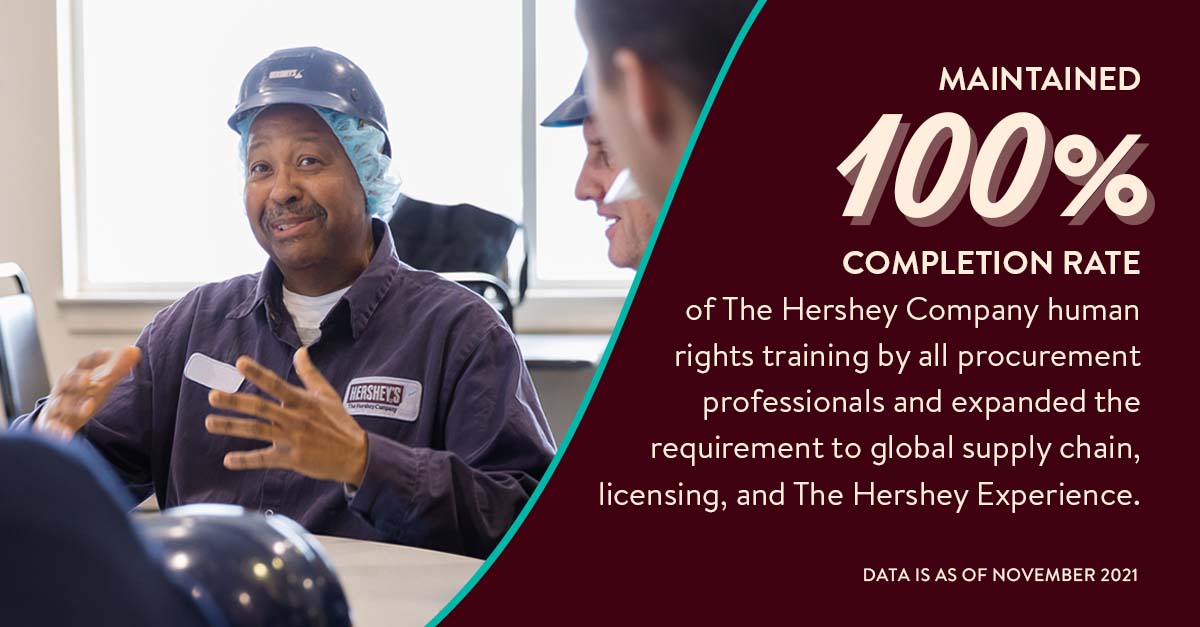
Collaborating with Industry Partners to Advance our Living Wage & Income Agendas
We believe that all individuals across our supply chain deserve the opportunity to earn a living wage income. Among our sourcing geographies, the lack of income for farmers is a root cause of poverty and increases the risk of other human rights violations such as child or forced labor and deforestation.
In addition to paying all full-time global employees a living wage, we took new steps this year to advance progress within The Hershey Company, including launching our first-ever position statement and creating an internal analytics dashboard to review wages in real time. We also partnered with IPSOS to begin a baseline assessment of farmer incomes in Ghana and Côte d’Ivoire to understand the nuances and challenges related to income. The baseline will be completed in early 2022 and we look forward to sharing more progress on the project in the coming months.
We recognize that advancing a living wage is a collaborative effort requiring partnership within and beyond our industry. This year, we took critical new steps, including acting as a co-chair of the Living Wage Working Group at AIM-Progress, a responsible sourcing industry association, where we co-authored the AIM-Progress Engagement Position on Living Wage. In addition, Hershey joined the IDH, The Sustainable Trade Initiative Business Call to Action and is helping support the development of the IDH Manufacturing Salary Matrix—creating essential tools for industry action on living wage in the supply chain. Finally, we’re proud to be an affiliate member of the new Living Wage for US initiative to help advance progress here in the United States.
We are committed to using our influence and business relationships to promote fundamental human rights within our company and throughout our value chain. I’m proud of the progress we’ve made this year despite numerous challenges. We recognize there’s still work to be done, and remain grounded in core principles of equity, equality, respect and dignity.
*The Hershey CLMRS programs are implemented by our suppliers on Hershey Cocoa For Good farms and local communities in Côte d’Ivoire and Ghana and actively seek to prevent, identify and remediate any instances of child labor found in our cocoa supply chain.
